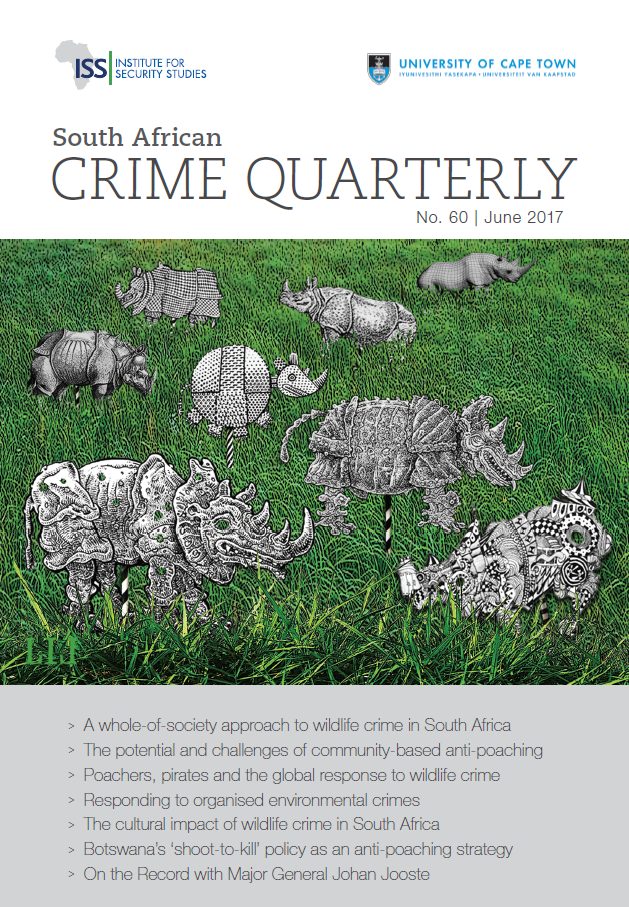Inclusive Anti-poaching? Exploring the Potential and Challenges of Community-based Anti-Poaching
DOI:
https://doi.org/10.17159/2413-3108/2017/i60a1732Keywords:
Poaching, Anti-Poaching, CBNRM, Conservation, RhinoAbstract
In acknowledgement that the largely (para)militarized approach to anti-poaching has its limitations, alternative approaches to conservation law enforcement are being sought. One alternative focuses on including people from local communities in anti-poaching, what we call inclusive anti-poaching. Using a case study of a community scout programme from southern Mozambique, located adjacent South Africa’s Kruger National Park, we examine the potential of a community scout initiative to move towards a more inclusive and sustainable approach to anti-poaching and conservation. While highlighting its challenges and potential drawbacks, we argue that including local people into conservation law enforcement efforts can help address poaching and problematic aspects of current anti-poaching measures. However, to be a genuine and sustainable alternative, community ranger programmes must be part of a broader shift towards developing local wildlife economies that benefits local communities as opposed to supporting pre-existing anti-poaching interventions.
Downloads
References
W. Annecke, and M. Masubele, A review of the impact of militarisation: the case of rhino poaching in Kruger National Park, South Africa. Conservation and Society, 14(3) (2016) 195- 204.
D. Biggs, R. Cooney, D. Roe, et al., Developing a theory of change for a community‐based response to illegal wildlife trade. Conservation Biology 00(0) (2016) 5-12.
F., Booker, & Roe, D. (2016). First line of defence? A review of evidence on the effectiveness of engaging communities to tackle illegal wildlife trade: International Institute for Environment and Development.
B. Büscher and M. Ramutsindela Green violence: rhino poaching and the war to save Southern Africa's peace parks. African Affairs, 1-22.
K. Carlson, J. Wright, and H. Dönges (2015). In the line of fire: elephant and rhino poaching in Africa. Small Arms Survey.
R. Cooney, D. Roe, H.T. Dublin et al., From poachers to protectors: engaging local communities in solutions to illegal wildlife trade. Conservation Letters 00(0), (2016).
R. Duffy, Waging a war to save biodiversity: the rise of militarized conservation. International Affairs 90(4), (2014), 819-834.
R. Duffy, and J. Humphreys, (2014) Mapping Donors: Key Areas for Tackling Illegal Wildlife Trade (Africa and Asia): UK Department for International Development.
R. Duffy, F. A., St John, B. Büscher et al., The militarization of anti-poaching: undermining long term goals? Environmental Conservation, 42(04), (2015), 345-348.
A. Hübschle, The social economy of rhino poaching: of economic freedom fighters, professional hunters and marginalized local people. Current Sociology (2016) 1-21.
J. S. Kahler, G. J., Roloff, and M. L. Gore, Poaching risks in community‐based natural resource management, Conservation Biology 27(1), (2013), 177-186.
M. Linkie, D.J. Martyr, A. Harihar, et al., Safeguarding Sumatran tigers: evaluating effectiveness of law enforcement patrols and local informant networks. Journal of Applied Ecology 52(4), (2015), 851-860.;
W. Lotter, and K. Clark, Community involvement and joint operations aid effective anti-poaching in Tanzania, Parks 20(1), (2014), 19-28
E. Lunstrum, Green militarization: anti-poaching efforts and the spatial contours of Kruger National Park, Annals of the Association of American Geographers 104(4) (2014), 816-
F. Massé and E. Lunstrum, Accumulation by securitization: Commercial poaching, neoliberal conservation, and the creation of new wildlife frontiers, Geoforum 69 (2016), 227-237.
D. Roe, (2015). Conservation, crime and communities: case studies of efforts to engage local communities in tackling illegal wildlife trade. International Institute for Environment and Development.
D. Roe, Cooney, R., Dublin, et al., (2015). Beyond enforcement: engaging communities in tackling wildlife crime: International Institute for Environment and Development.
D. Smith, Thousands of rhinos, 500 poachers; grim toll in the hunt for prized horns, The Guardian, 18 October 2015, https://www.theguardian.com/environment/2015/oct/18/rhino-horn-boom-impoverished-african-poachers (accessed 12 January 2017).
G. Stuart-Hill, R. Diggle, B. Munali, et al., The event book system: a community-based natural resource monitoring system from Namibia. Biodiversity & Conservation 14(11), (2005), 2611-2631.
N. Wikie, M. Painter, and A. Jacob, (2016). Measuring Impact: Rewards and Risks Associated with Community Engagement in Anti-Poaching and Anti-Trafficking: United States Agency for
International Development.
Downloads
Additional Files
Published
Issue
Section
License
Copyright (c) 2017 Author and Institute for Security Studies

This work is licensed under a Creative Commons Attribution 4.0 International License.
SACQ is licenced under a creative commons licence (CC BY) that allows others to distribute, remix, tweak, and build upon your work, even commercially, as long a they give appropriate credit, provide a link to the license, and indicate if changes were made. They may do so in any reasonable manner, but not in any way that suggests the licensor endorses you or your use.
Copyright for articles published is vested equally between the author/s, the Institute for Security Studies and the Centre of Criminology (UCT).




.png)